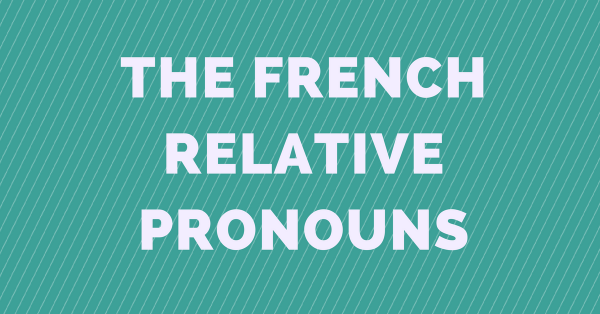In this lesson, we'll talk about French relative pronouns or pronom relatifs.

A Review of Relative Pronouns in English
Are you still familiar with relative pronouns in English? If you can no longer recall all those grammar lessons in school, don't worry, this topic is fairly easy. Plus I'm pretty sure you use relative pronouns in your daily speech.
In English, relative pronouns are the words who, which, that, whom and where. These types of pronouns serve several purposes:
To talk about it in grammar-y technical terms, relative pronouns are also used:
French Relative Pronouns
When it comes to French, relative pronouns work the same way. These are the words qui, que, lequel, auquel, duquel, dont and où.
1. qui and que
Qui and que can both be used to refer to persons or things. The main difference is, qui is used for the subject (or indirect object for persons) while que is for the direct object. Qui is also being used after a preposition (à, de or pour)
Qui (subject) could mean who, which, or that.
Que (direct object) could mean who, whom, which, or that.
A few examples:
Mon frère, qui a vingt ans, est à l'université. (My brother, who's twenty, is at university.)
*Est-ce qu'il y a un bus qui va au centre-ville? (ls there a bus that goes to the town centre?)
Les amis que je vois le plus sont Léa et Mehdi. (The friends that I see most are Lea and Mehdi.)
Voilà la maison que nous voulons acheter. (That's the house which we want to buy.)
la personne à qui il parle (the person he is speaking to)
les enfants pour qui j'ai acheté des bonbons (the children I bought sweets for)
*Kindly note that que is shortened to qu' if it precedes a word that starts with a vowel or most words that begin with a letter h.
Quick reminder
Here's a major difference between English and French relative pronouns: in English, who, which and that are often being interchanged in daily use. In French, however, this in not the case. Qui and que strictly have separate uses for each.
2. lequel
Lequel is the French relative pronoun counterpart for “which” and it is used for indirect objects. It follows the prepositions à, de or pour and only used when referring to things (never about people). In addition, it has to agree with the noun's gender (masculine or feminine) and number (singular or plural).
Masculine singular | lequel |
Feminine singular | laquelle |
Masculine plural | lesquels |
Feminine plural | lesquelles |
All four means “which”
Some examples:
le livre pour lequel elle est connue (the book she is famous for)
la table sur laquelle j'ai mis mon sac (the table I put my bag on)
Aside from having to agree with the noun's gender and count, you also need to consider the combinations of words which, in turn, creates an altogether new word.
For example:
- à + the definite article le becomes au.
- de + the definite article le becomes du.
- à + the definite article les becomes aux.
- de + the definite article les becomes des.
Similarly, lequel changes into different words when combined with the preposition à and de.
Still Stuck at Intermediate French?

Break through the plateau with our proven coaching and study method.
à + lequel | auquel |
à + laquelle | à laquelle (remains the same) |
à + lesquels | auxquels |
à + lesquelles | auxquelles |
de + lequel | duquel |
de + laquelle | de laquelle (remains the same) |
de + lesquels | desquels |
de + lesquelles | desquelles |
3. dont
Another French relative pronoun is dont. When translated in English, it means whose, of whom, of which. It may be used to refer to persons or things. The good news is, it does not change its form, nor does it have to agree with anything!
Let's see some examples:
Plural noun: les films dont tu parles (the films you are talking about)
Singular noun: la femme dont la voiture est en panne (the woman whose car has broken down)
4. où
This French relative pronoun is used for places and times. Its English counterpart could either be where, when or even which and that, depending on how it is used.
Où is also used as the question word where (see article on ASKING QUESTIONS IN FRENCH) and the way it is used as an interrogative pronoun is basically the same as its use as a relative pronoun. There is an added function however, and that is to refer to a time something occurred.
In short, it covers both place and time in its relative pronoun function and takes the job of “when” as well, aside from “where”. (Note: the interrogative pronoun “quand” is not as multifunctional as où and cannot be used as a relative pronoun.)
Some examples:
Paris est la ville où on peut manger les meilleurs escargots. (Paris is the city where we can eat the best snails.)
C'est l'année où ils ont gagné la coupe du monde. (That's the year they won the world cup.)
In addition, où can also be used after prepositions.
La ville d'où elle vient… The city (where) she's from...
Quick Recap on French Relative Pronouns
Learn More about French Grammar:
Your turn!
Can you try making your own sentences using the French relative pronouns you learned in this lesson? Share it with us in the comments section!
Still Stuck at Intermediate French?

Break through the plateau with our proven coaching and study method.
Here are some FAQs about French Relative Pronouns
What are relative pronouns in French?
Dont (whose, of whom, of which), lequel (which), où (where), que (that), and qui (who) are the five French relative pronouns!
When do you use the French relative pronouns qui and que?
Qui and que are used to refer to persons or things.
When to make agreement in French reflexive relative pronouns?
Reflexive pronouns must agree with the subject. The agreement happens when a clause with a pronominal verb in the infinitive form follows an impersonal subject.
Examples:
Il est difficile de se coucher tôt le soir.
It is difficult (for people in general) to go to bed early at night.
Il est difficile de me coucher tôt le soir.
It is difficult (for me) to go to bed early at night.
Il est difficile de nous coucher tôt le soir.
It is difficult (for us) to go to bed early at night.
When do you use subjunctive in French after relative pronouns?
In French, you use the subjunctive after the relative pronouns if the antecedent in the main clause does not exist or is indefinite.
For example:
Il n’y a aucun plat qui me fasse plaisir.
There is no dish that makes me happy.
How do you know when to use relative pronouns in French?
You will use relative pronouns when you connect a main clause and a relative clause.
For example:
Mon cousin, qui a trente ans, est à Paris.
(My brother, who’s twenty, is in Paris.)

Very helpful. Thank you.
Your lessons are very helpful